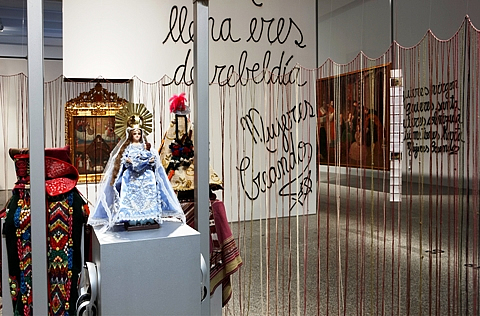Museo Nacional de Arte Reina Sofia,
May 12, 2010 - Sep 06, 2010
Madrid, Spain
The Potosí Principle
by Jaime Vindel
In the specific case of Principio Potosí, one wonders to what extent placing this self-critical look at the genocidal colonial role of the metropolis at the very center of its leading cultural center turns the strict redemption of a historical guilt complex into a social instrument with which to analyze forms of economic and cultural neo-colonialism that still exist, under different guises, to this day. (5) Moreover, the curatorial process was not free of tensions, and these perhaps serve to explain the more worrisome aspects of its final execution. The hopscotch devised by Creischer, Hinderer and Siekmann, which is accompanied by an exhibition guide whose explanatory tone lies halfway between the authority and the arrogance of a wise Marxist, is beset by highs and lows stemming not only from the intrinsic potential of the works. Some, provide evidence of the obsolescence of some of the more hackneyed strategies of institutional critique - but also of associative excesses and the establishment of a relationship between different phenomena that tend to lay bridges between forms of exploitation whose historical authenticity resists attempts to find superficial equivalents. (6)
In that regard, it is interesting that MNCARS has decided to take into account the views of the members of the initial curatorial team who decided to leave the project following differences with its European counterpart. In its attempt to generate criticism from within its walls, the museum sought to “highlight the tensions in the north-south dynamics of the knowledge, distances and borders between one way of thinking and another, and above all leave room for disagreement in a complex exhibition project”. (7) That disagreement stems from the position put forward by the Aymara sociologist, historian and activist Silvia Rivera Cusicanqui and the ethnomusicologist Eduardo Schwartzberg -both members of the Bolivian El Colectivo cultural action and criticism group- in the catalogue Principio Potosí Reverso.(8) Divided into three parts that subvert the lineal reading order, this publication proposes an epistemological spin that shifts the focus from a self-critical review of Western history to an approach based on recognizing and vindicating Andean thought, customs and languages, as opposed to Christian morals, cosmogony and teleology. Aware, as the cultural critic Xavier Antich has pointed out, of the parallelism between the Spanish Empire’s cultural imposition of a visual universe (good examples of which can be found in the Potosí school paintings of saints, virgins and archangels at the MNCARS), and the legitimization of the “violence of domination and exploitation”,(9) the catalogue’s authors trace the symbolic infiltrations and the specific nature of Andean rituality.
Thus, in the celebratory context of 2010, the aim was to make room for “another bicentennial”, to use Rivera Cusicanqui’s expression in her recent book Ch´ixinakax utxiwa. Una reflexión sobre prácticas y discursos descolonizadores (A Reflection on Decolonizing Practices and Discourses). Differing from both the Creole celebrations of Latin American independence with which the subcontinent’s media is currently awash and the aforementioned metropolitan revisionism, Rivera Cusicanqui’s approach centers on the insurgent movements of native Andean communities. On referring to milestones such as Tupaq Katari’s revolt against the Spanish Empire in 1781, she emphasizes the repercussions of that imaginary of resistance on much more recent uprisings: “if we look at Katari’s rebellion from the standpoint of the present, its memory is projected into the series of uprising and roadblocks that took place in 2000-2005 and whose epicenter was the city of El Alto, one of the main rebel-troop garrisons in 1781”.(10) The search for other dates on which to pinpoint the turning point in collective emancipation processes in Latin America, as an alternative to the neo-colonial ideology with which most of its nation-states concur, has led other intellectuals to embark on various research projects. Such is the case with Eduardo Grüner, who in the first issue of the MNCARS journal -whose publication coincided with the presentation of Principio Potosí- outlines some of the conclusions put forward in his book La oscuridad y las luces. Capitalismo, cultura y revolución (Darkness and Enlightenment: Capitalism, Culture and Revolution), a genuine flipside of the commemoration of bicentennial glories. Whereas Rivera Cusicanqui focuses on the ethnic otherness of indigenous Andeans in an approach that simultaneously subtracts from the essentiality of the archaic and the more postmodern poetics of hybridization, Grüner views article 14 of the Haitian Constitution of 1805 (“All citizens shall henceforth be known generically as negroes”) as the starting point of a revolutionary process (a revolution more French than the French Revolution, to use his words), in which racial dis-identification was the guarantee -subsequently revoked-of political equality.(11)
|









